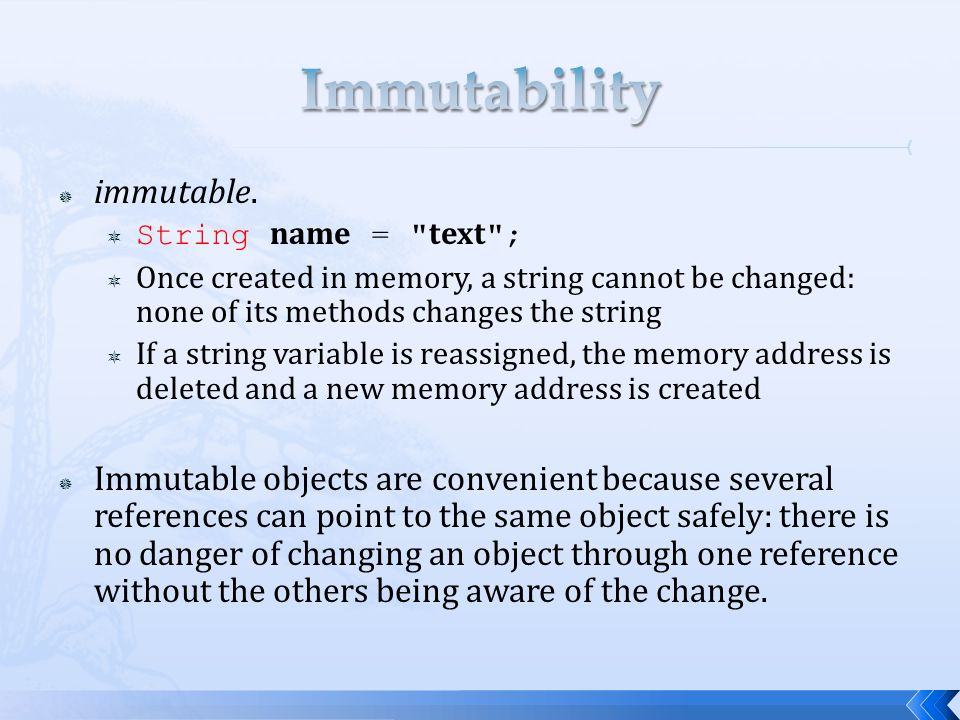Why Are Strings Immutable in Java? Trick Reasons and Advantages Described
What Is Unalterable Strings and Exactly How It Functions
In the world of shows, comprehending the concept of unalterable strings is extremely important for producing secure and robust applications. Immutable strings describe strings that can not be changed after they are developed, guaranteeing information stability and predictability within the code. This fundamental principle plays a crucial role in different programming languages and offers an one-of-a-kind approach to taking care of data. By discovering the ins and outs of how immutable strings function, one can reveal a globe of benefits and possibilities that can elevate the quality and effectiveness of software program advancement.
The Essentials of Immutable Strings
Immutable strings, as a fundamental principle in programming, are character series that can not be changed as soon as they are created. This implies that when a string is appointed a worth, that worth can not be modified. In languages like Python and Java, strings are immutable things, causing various effects in terms of memory management and data stability.
Among the key benefits of immutable strings is that they give a feeling of security in data control. Given that the content of an unalterable string can not be modified, it makes sure that the initial data remains intact, minimizing the risk of unintentional changes throughout program execution (Why are strings immutable in Java?). This building likewise streamlines debugging procedures, as programmers can rely on that once a string is defined, its worth will not be accidentally altered
Furthermore, immutable strings help with effective memory usage. When a brand-new string is produced based upon an existing one, as opposed to modifying the original string, the brand-new worth is saved individually. This method boosts performance by decreasing memory fragmentation and simplifying memory allowance processes. Generally, recognizing the basics of unalterable strings is important for grasping programming concepts and enhancing code effectiveness.
Benefits of Unalterable Strings
Building upon the safety and efficiency advantages of immutable strings, their advantages prolong to improving code reliability and streamlining concurrent programming jobs. By being unalterable, strings can not be changed after creation, which removes the risk of unplanned changes in the information they store. This fundamental immutability ensures that once a string is developed, its worth stays consistent throughout the program's implementation, reducing the opportunities of insects created by unexpected alterations.
Additionally, immutable strings add to code integrity by making it much easier to reason concerning the state of a program. Given that strings can not be changed, programmers can trust that a string will constantly hold the same value, simplifying debugging and maintenance efforts. This predictability leads to extra reliable and stable codebases.

Implementation in Programming Languages
Within numerous programs languages, the incorporation of immutable strings is a fundamental element that influences just how information is taken care of and adjusted within code structures. The execution of unalterable strings differs across different programming languages, with each language offering its own systems to sustain this idea.

In comparison, languages like C and C++ do not have built-in support for immutable strings. Programmers in these languages should by hand implement immutability by enforcing policies within their code to avoid direct adjustments to string items.
Finest Practices for Working With Unalterable Strings
When dealing with immutable strings in programs languages like Java and Python, adhering to best techniques makes sure safe and secure and effective data manipulation. Among the key ideal methods is to utilize StringBuilder or StringBuffer rather of straight controling strings, specifically when taking care of substantial concatenation operations. These classes supply mutable alternatives for string manipulation, helping to avoid unnecessary memory allowances and boosting efficiency.
In addition, when functioning with sensitive information such as passwords or API tricks, it is crucial to stay clear of keeping them as plain text in unalterable strings. Utilizing safe storage space mechanisms like char varieties or specialized collections for taking care of delicate info helps minimize safety dangers connected with immutable strings.
Real-world Applications and Examples
Discovering useful implementations of immutable strings in numerous sectors discloses their considerable influence on data integrity and system dependability. In the health care field, unalterable strings play a vital duty in guaranteeing the protection and privacy of client information. By stopping unapproved adjustments to delicate details such as medical records and prescriptions, unalterable strings aid maintain conformity with strict privacy laws like HIPAA.
Banks also take advantage of the immutable nature of strings to boost the security of customer information and transaction documents. Immutable strings have a peek here aid stop fraud and unauthorized modifications to financial information, giving a durable defense against cyber risks and making sure the trust fund and confidence of clients.

Verdict
To conclude, unalterable strings are fixed and unchangeable series of characters that provide benefits such as string safety and security and improved performance in shows. They are carried out in numerous shows languages to guarantee information honesty and safety. Ideal techniques for collaborating with unalterable strings consist of staying clear of straight alterations and using approaches that return new string things. Real-world applications go right here of unalterable strings consist of data security, caching, and string manipulation jobs.
Unalterable strings refer to strings that can not be altered after they are developed, guaranteeing information honesty and predictability within the code. When a brand-new string is produced based on an existing one, rather than customizing the original string, the new value is saved separately.In languages like Java and Python, strings are unalterable by default, implying that as soon as a string things is created, its worth can not be transformed - Why are strings immutable in Java?. Finest practices for functioning with immutable strings consist of staying clear of straight adjustments and using techniques that return new string objects. Real-world applications of unalterable strings consist of data security, caching, and string adjustment tasks